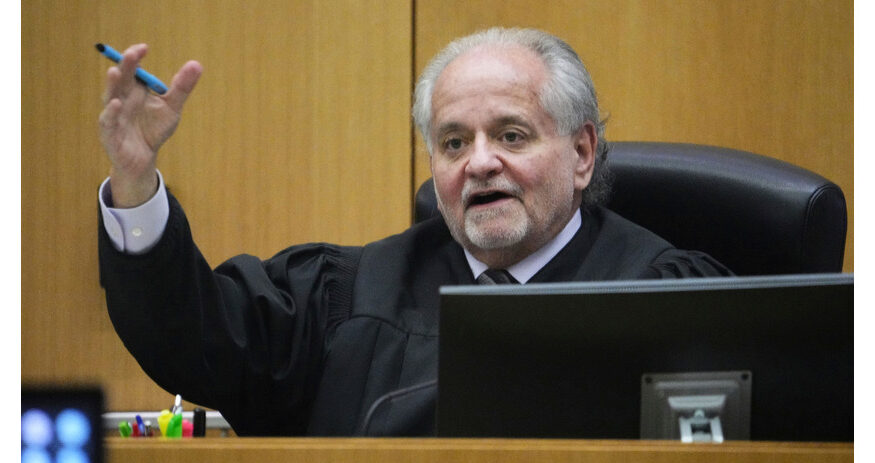Phoenix, AZ—Judge Bruce Cohen has recused himself from overseeing the high-profile case led by Arizona Attorney General Kris Mayes against 18 individuals accused of participating in an alternative electors scheme during the 2020 presidential election. The decision follows the release of controversial emails in which Cohen expressed strong political opinions, raising questions about his impartiality in such a politically charged case.
Background of the Case
In April 2024, Arizona Attorney General Kris Mayes filed charges against 18 individuals, including notable figures such as former White House Chief of Staff Mark Meadows, attorney Rudy Giuliani, and legal scholar John Eastman. The charges, which include conspiracy, forgery, and fraudulent schemes, allege efforts to overturn the results of the 2020 presidential election by submitting an alternative slate of electors favoring then-President Donald Trump.
This case is considered one of the most significant legal battles stemming from the contentious aftermath of the 2020 election. It aims to address allegations of coordinated efforts to disrupt the peaceful transfer of power, a cornerstone of American democracy.
Controversial Emails Come to Light
Judge Bruce Cohen’s recusal comes in the wake of leaked emails that have sparked widespread criticism. In a series of messages sent to colleagues in August 2024, Cohen criticized white men, expressed strong support for Vice President Kamala Harris, and drew comparisons between her critics and Nazi sympathizers.
One of the emails stated:
“It does matter if your chromosomes are made up of ‘XY.’ It matters even more if your skin color is characterized as ‘white’ or Caucasian. We must speak out… We cannot allow our female colleagues to feel as if they stand alone… We no longer can stay silent merely because others are exercising their right to free speech—we, too, have that same right.”
Critics argue that such statements compromise Cohen’s ability to maintain judicial impartiality, particularly in a case involving prominent political figures and a contentious electoral issue. Supporters of Cohen contend that his comments reflect a broader commitment to diversity and equality in public discourse.
The Decision to Recuse
Amid mounting criticism, Cohen announced his decision to recuse himself from the case, citing the need to preserve public confidence in the judiciary. His departure necessitates the assignment of a new judge, which could potentially delay proceedings in this already complex legal matter.
Legal analysts have highlighted the importance of impartiality, particularly in high-stakes cases like this one. “Judicial integrity is paramount in cases that carry political implications,” said legal ethics expert Dr. Linda Carlson. “Any perception of bias can undermine public trust in the outcome.”
Public and Political Reactions
The controversy surrounding Cohen’s emails has ignited intense debate among legal professionals, political commentators, and the public. Critics of Cohen’s actions argue that his comments reveal an unacceptable level of bias, which could have tainted the proceedings. Others see the episode as emblematic of broader issues within the judiciary and call for reforms to ensure greater transparency and accountability.
Independent Arizona lawmaker Peter Andrews criticized Cohen’s emails, stating, “Judges have a duty to remain neutral. Expressing such strong political opinions undermines their credibility and the integrity of the judicial process.”
Conversely, some progressive voices have defended Cohen, arguing that his comments were taken out of context and that judges are entitled to express personal opinions outside the courtroom.
What’s Next for the Case?
The Arizona judicial system is now tasked with appointing a new judge to oversee the case. Attorney General Mayes has reiterated her office’s commitment to pursuing accountability for those involved in the alleged scheme.
“Our focus remains on ensuring justice and upholding the rule of law,” Mayes said in a statement. “We will continue to pursue this case with the seriousness it demands.”
The case’s progress will likely be closely watched nationwide as it underscores ongoing debates about election integrity and the legal repercussions of efforts to overturn certified election results.
Conclusion
Judge Cohen’s recusal adds another layer of complexity to an already contentious legal battle. The case, which centers on one of the most divisive chapters in recent American history, highlights the challenges of maintaining judicial impartiality in politically charged environments. As the proceedings move forward, the focus will remain on how the judiciary and legal system navigate these sensitive and consequential issues.
Sources
- The Gateway Pundit: Arizona Judge Recuses Himself After Controversial Emails
- Arizona Daily Independent: Controversy Over Judge Cohen’s Emails
- Associated Press: Updates on Arizona Electors Case
- Reuters: Legal Ethics and Judicial Impartiality
- The Hill: Arizona AG’s Election Integrity Case Faces New Delays

